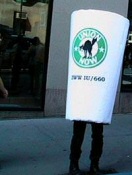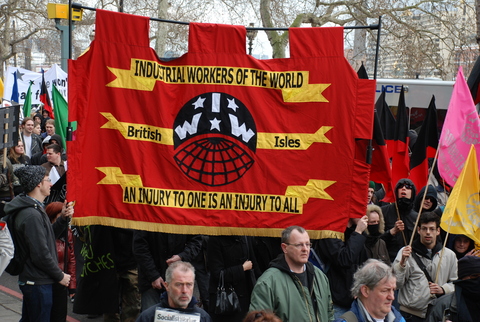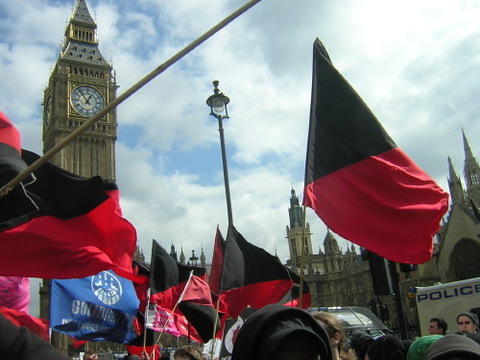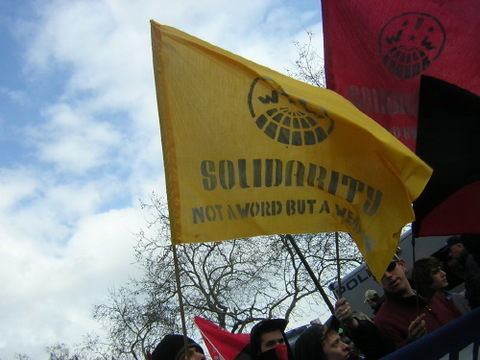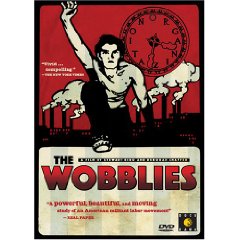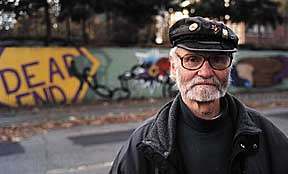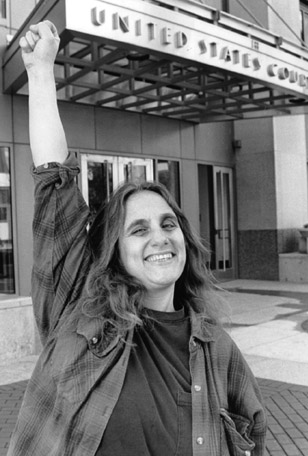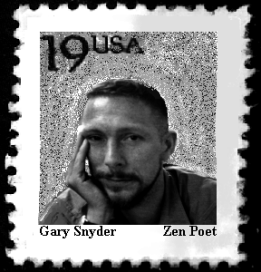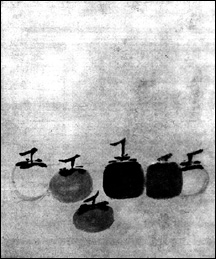Another poem from an ex IWW member. Lew Welch was a Beat poet who you might have come across as Dave Wain in Jack Kerouac’s novel Big Sur. This is the longest poem from Mountains and Rivers Without End. This is a road song and a portrait of the West Coast in the late 50s and early 60s, which mentions the Everett Massacre in 1916, in which a number of Wobblies and others were killed. An account of the Massacre may be found at:
http://www.ac.wwu.edu/~n9517146/bloodysunday.html.
Night Highway 99
Only the very poor, or eccentric, can surround themselves with shapes of elegance (soon to be demolished) in which they are forced by poverty to move with leisurely grace. We remain alert so as not to get run down, but it turns out you only have to hop a few feet to one side and the whole huge machinery rolls by, not seeing you at all.
Lew Welch
We’re on our way
man
out of town
go hitching down
that highway 99
Too cold and rainy to go out on the Sound
Sitting in Ferndale drinking coffee
Baxter in Black, been to a funeral
Raymond in Bellingham–Helena Hotel–
Can’t go to Mexico with that weak heart
Well you boys can go south. I stay heare.
Fix up a shack–get a part-time job
(he disappeared later
maybe found in the river)
In Ferndale & Bellingham
Went out on trail crews
Glacier and Marblemount
There we part.
Tiny men with mustaches
driving ox teams
deep in the cedar groves
wet brush, tin pants, snoose—
Split-shake roof barns
over berry fields
white birch chicken coop
Put up in Dick Meigs cabin
out behind the house–
Coffeecan, PA tin, rags, dirty cups,
Kindling fell behind the stove, miceshit,
old magazines,
winter’s coming in the mountains
shut down the show
the punks go back to school
and the rest hit the road–
strawberries picked, shakeblanks split
fires all out and the packstrings brought
down to the valleys:
wet loose to graze.
Gray wharves and hacksaw gothic homes
Shingle mills and stump farms
overgrown
Fifty weary Indians Mt. Vernon
Sleep in the bus station
Strawberry pickers speaking Kwaikiutl
turn at Burlington for Skagit & Ross Dam
under apple trees by the river
banks of junked cars
BC Riders give hitchhikers rides
“The sheriff’’s posse stood in double rows Everett
flogged the naked Wobblies down
with stalks of Devil’s Club
& run them out of town”
While shingle weavers lost their fingers
in the tricky feed and take
of double saws
Dried, shrimp
smoked, salmon
–before the war old Salish gentleman came
& sold us kids rich hard-smoked Chinook
from his flatbed model T
Lake City,
waste of trees & topsoil, beast, herb
edible roots, Indian field-farms & white men
dances washed, leached, burnt out
minds blunt, ug! talk twisted
a night of the long poem
and the mined guitar
“Forming a new society
within the shell of the old”
mess of tincan camps and littered roads.
The Highway passes straight through every town
at Matsons washing bluejeans
hills and saltwater
ack, the woodsmoke in my brain
(high Olympics—can’t go there again)
East Marginal Way the hitchhike zone
Boeing down across Duwamish slough
and angle out &on.
Night rain wet concrete headlights blind Tacoma
salt air / bulk cargo / steam cycle / AIR REDUCTION
eating peanuts I don’t give a damn
if anybody ever stops I’ll walk
to San Francisco what the hell
“that’s where you going?
why you got that pack?”
“well man I just don’t feel right
without something on my back”
& and this character in milkman overalls
“I have to come out her
everyone in a while, there’s a guy
blows me here”
way out of town
Stayed in Olympia with Dick Meigs
–this was a different year & he had moved—
sleep on a cot in the back yard
half the night watch shooting stars
These guys got babies now
drink beer, come back from wars,
“I’d like to save up all my money
get a big new car, go down to Reno
& latch onto one of those rich girls—
I’d fix their little ass”—nineteen yr old
North Dakota boy fixing to get married next month.
To Centralia in a purple Ford.
Carstruck dead doe
by the Skookumchuck river
Fat man in a Chevrolet
Wants to go back to L.A. “too damned poor now”
Airbrakes on the log trucks hiss and whine
stand in the dark by the stoplight
big fat cars tool by
drink coffee, drink more coffee
brush teeth back of Shell
hot shoes
stay on the righside of that
yellow line
Mary’s corner, turn for Mt. Rainer
–once caught a ride at night for Portland here.
Five Mexicans ask me “chip in on the gas.”
I never was more broke & down.
Got fired that day by the USA
(the District Ranger up at Packwood
thought the Wobblies had been dead for
forty years
but the FBI smelled treason
–my red beard
That Waco Texas boy
took A.G. and me through miles of snow
had a chest of logger gear
at the home of an Indian girl
in Kelso hadn’t seen since fifty-four
Toledo, Castle Rock, free way four lane
no stoplights and no crossings, only cars,
& people walking, old hitchhikers
break the laws. How do I know…
the state cop
told me so.
Come a dozen times into
Portland
on the bum or
hasty lover
late at night.
Dust kicking up behind the trucks—night rides— Who
waits in the coffee stop
night highway 99
Sokei-an met an old man on the banks of the
Columbia growing potatoes & living all alone,
Sokei-an asked him the reason why he lived there,
he said,
Boy, no one ever asked me the reason why,
I like to be alone.
I am an old man.
I have forgotten how to speak human words.
All night freezing in the back of a truck dawn
at Smith River battering on in
logger’s pickups
prunes for lunch
The next night, Siuslaw.
Portland sawdust down town Buttermilk
comer all you want for a nickel
(now a dime) —Sujata gave Guatama
buttermilk. (No doubt! says Sokei-an, that’s
all it was:
plain buttermilk)
rim of mountains,
pulp bark chewed snag papermill tugboom in the
river —use to lean on bridge rails dreaming up
eruptions and quakes-Slept under juniper in the
Siskiyou Yreka a sleeping bag, a foot of snow
black rolled umbrella ice slick asphalt
Caught a ride the only car come by at seven
in the morning chewing froze
salami
riding with a passed-out L.A. whore
glove compartment full of booze, the
driver a rider,
nobody cowboy sometime hood,
Like me pick up to drive
& drive the blues away.
We drank to Portland
and we treated that girl good.
I split my last two bucks with
him in town
went out to Carol & Billy’s in the woods.
Foggy morning in Newport
housetrailers
under the fir.
An old book on Japan at the Goodwill
unfurled umbrella in the sailing snow
sat back in black wood
barber college chair, a
shave
On Second Street in Portland.
What elegence. What a life
Bust my belly with a quart of
buttermilk
& five dry heels of French bread
from the market cheap
clean shaved, dry feet
We’re on our way
man
out of town
Go hitching down that
highway 99.
Oil pump broken, motor burning out Salem
Ex logger selling skidder cable
wants to get to San Francisco,
fed and drunk Eugene
Skidder cable: cable used for dragging (skidding) logs.
Guy just back from Alaska—don’t like
the States now — too much law Sutherlin
A woman with a kid & two bakes of hay Roseburg
Sawmill worker, young guy thinking of
going to Eureka for redwood logging later in the year Dillard
Two Assembly of God Pentacostal boys from a
holy-roller high school. One had
spoke in tongues Canyonville
(LASME Lost Angeles-Seattle Motor Express
place on highway 20
LITTLE ELK badger &
badger
South of Yoncalla bum the engine
run out of oil (a different car) (Six
great highways; so far only one)
Jumpoff Joe Creek &
a man carrying nothing, walking sort of stifflegged
along, blue jeans & denim jacket wrinkled
face, just north of Louse Creek
—Abandon really means it the network womb
stretched loose all things slip through
Dreaming on a bench under newspapers I woke up
covered with rhododendron blooms alone in a
State Park in Oregon.
“I had a girl in Oakland who worked
for a doctor, she was a nurse, she let him
eat her. She died of tuberculosis
& I drove back that night to Portland
nonstop, crying all the way” Grants Pass
“I picked up a young mother with two children once,
their house had just burned down”
“I picked up an Italian tree-surgeon in
Port Angeles once, he had all his saws
and tools all screwed & bolted on a beatup
bike.”
Oxyoke, Wolf Creek, a guy Coming off a five-day binge to
Phoenix
An ex-bartender from Lebanon to Redding
Man & wife on a drinking spree, to Anderson
Here we enter California again.
Snow on the pines & firs around Lake Shasta
—Chinese scene of winter hills and trees us “little
travelers” in the bitter cold six-lane highway slash
& D-9 Cats — bridge building squat earthmovers
—yellow bugs
I speak for hawks. Creating “Shasta as I go—”
The road that’s followed goes forever;
in half a minute crossed and left behind.
Out of the snow and into red-dirt plains
blossoming plums
Each time you go that road it gets more straight
curves across the mountain lost in fill
Improvements to 99 were underway…
towns you had to slow down all four lane
Azalea, Myrtle Creek
watch out for deer.
At Project City Indian hitcher Standing
under single tarpole lamp
nobody stopped
we walked for miles to an oak fire left
by the road crew, shivered the night
away
Going to San Francisco
Yeah San Francisco
Yeah we came from Seattle
Even farther north
Yeah we been working in the mountains
in the spring
in the autumn
I always go this highway 99-
“I was working in a mill three weeks there then it
burned down & the guy didn’t even pay us off—
but I can do anything— I’ll go to San Francisco—
tend bar—”
Sixteen speeds forward windows open Stopped at
the edge of Willows for a bite
grass shoots on the edge of drained
rice plains
—where are the Sierras—
standing in the night in the world-end winds by
the overpass bridge
junction US 40 and highway 99
trucks, trucks roll by kicking up
dust dead flowers
level, dry.
Highway turns west.
Miles gone, speed still pass
through lower hills heat
drying
toward Vallejo gray on the
salt baywater
brown grass ridges
buckbrush blue.
Herons in the tideflats
have no thought for State of Cars
-I’m sick of car exhaust
City gleaming far away we make it
into town tonight get clean and
drink some wine—
SAN FRANCISCO
NO body
gives a shit
man who you are or
what’s your car
there IS no 99
Read Full Post »
